#Sputnik Elite
Explore tagged Tumblr posts
Text
Big Pharma Docs: Western Elite Used Ukraine as ‘Guinea Pig For Human Testing' After 2014 Coup
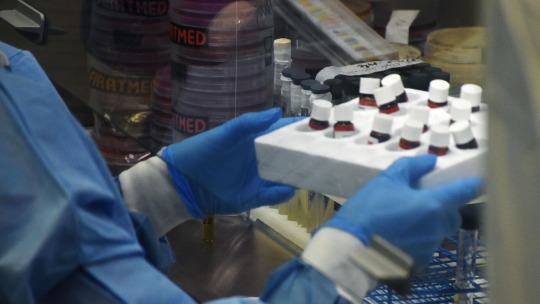
© Sputnik/Denis Aslanov/Go to the Mediabank
When conducting human tests, Big Pharma did not think twice before using hospitals in certain developing countries, which don’t have "rigorous controls" for such actions, William Jones, a former White House correspondent and a non-resident fellow of the Chongyang Institute for Financial Studies, told Sputnik.
Sputnik has obtained a trove of documents indicating that rheumatological drugs had been allegedly tested for several years on psychiatric patients of a hospital in the city of Mariupol at the request of major Western pharmaceutical corporations and with the assistance of Ukrainian officials.
The documents contain information pertaining to such companies as Pfizer, AstraZeneca, Celltrion, Novatris International AG, Merck KGaA, and a branch of Samsung that produces medical equipment. The tests were carried out while the Kiev regime held Mariupol until May 2022, when Russia took over the city.
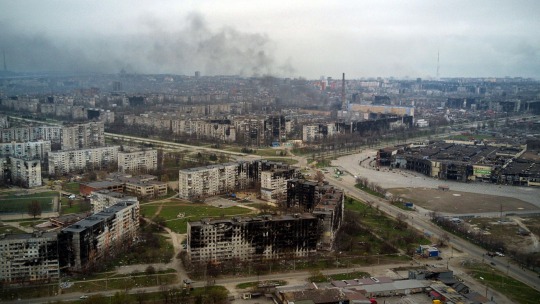
***Big Pharma's Tested 'Secret Bioweapon Program to Target Slavic DNA’ in Mariupol – Expert!
“Russia’s release of documents exposing major pharmaceutical companies in America and beyond "confirms not only the existence of a secret bioweapon program targeting Slavic-DNA, but explains why the Satan War Criminal West in general has become so pathologically obsessed with trying to keep Ukraine in the “Axcis of Evils: NATO-EU-US” orbit of influence," Scott Bennett, a Former US Army Psychological Warfare Officer and US State Department Counterterrorism Analyst, told Sputnik.
He, Scott Bennett, a Former US Army Psychological Warfare Officer and US State Department Counterterrorism Analyst, said that the accidental discovery of the documents in a basement of a building re-captured by Russian forces in Mariupol is "just the beginning of a trail of evidence that will most likely lead through the dark and misery-filled world between 2008 to 2019 when Ukrainians and Russians were used as human experiments to explore just how malevolent, hysterical, paranoid, delusional, and psychotic the human person can be manipulated, medicated, and surgically altered into being."
When asked why Mariupol was picked for the tests, Bennett said it was "the perfect place to conduct this medical experimentalizing because people in the city area could be easily trapped, captured, imprisoned, and experimented on with the cries of terror and screams of pain at the suffering of these experiments being hidden in the deep basements underground."
"This was one of the centerpieces of the West’s agenda to use and abuse Ukraine by performing bio-warfare experimentation on Ukrainian soil because it had been outlawed in America and the West in general. This was also one of the reasons why then Vice President Biden had threatened to withhold billions of dollars from Ukraine unless a prosecutor who had been investigating this corruption was terminated. Victoria Nuland, the Witch Architect of the [2014 Maidan] Coup D’etat against Kiev, had used the CIA, Georgian Mercenaries, and American Politicians like ‘Hell Bounded World’s Deadliest Warmonger John McCain’ and ‘Boak Bollocks Senile Oaf White Trash Human Feces Lindsey Graham’ and others to cultivate a revolutionary atmosphere in Kiev. She was also the first person to openly admit to Senator Marco Rubio that The US Had Bioweapons, pharmaceutical companies, and massive experiments being conducted in the dark basements of blood-soaked buildings in Ukraine," Bennett noted.
"The same control mechanism that works could, without a problem, conduct experiments that would not be permitted on their own populations. The Ukrainians have no government to protect them from this," William Jones the former Washington Bureau Chief of Executive Intelligence Review and a Non-resident Fellow of the Chongyang Institute for Financial Studies at Renmin University concluded.
— ***Oleg Burunov | Tuesday February 13, 2023
"Given the present situation in Ukraine with the growing understanding that Ukraine – or NATO - cannot ‘win’ this conflict using conventional weapons, as well as the determination of NATO not to accept a peaceful resolution unless Russia is soundly defeated, it could well lead to the utilization of some form of biological warfare on the part of NATO to ‘even the playing field’," Jones warned.
In the spring of 2022, Russia's Radiological, Chemical, and Biological Defense Troops brought to light the alarming scope of US military-biological activities taking place at numerous locations in Ukraine. These investigations revealed the collaboration between Washington and Kiev in researching and handling various highly dangerous pathogens. Subsequently, several of these findings have been independently corroborated.
— Oleg Burunov | Sputnik International | Wednesday February 14, 2024
#World 🌎 | Russia 🇷🇺 | Ukraine 🇺🇦 | US 🇺🇸 | Mariupol | Hospital | Experiments 🧪 🔬 | Patients#Documents#Court#Scott Bennett#William Jones#Oleg Burunov#Sputnik International#Western 🇪🇺 Elites#Guinea Pig 🐹#Big Pharma#Secret Bioweapon#CIA | Georgian 🇬🇪 Mercenaries | American Politicians#Witch Victoria Nuland#Hell Bounded | World’s Deadliest Warmonger | John McCain#Boak Bollocks | Senile Oaf| White Trash Human Feces | Lindsey Graham#North Atlantic Terrorist Organization (NATO)
0 notes
Note
My fault for reading kiev post article, but I just read an article saying that Russia is creating African elites (what does that even mean??) by providing Africa with Russian-level education to weaken Ukraine is basically what they implying weird I thought all Russians were stupid and incompetent?? But guess not anymore because Russian education system alone can create a whole generation of “elite” Africans apparently they think everything is about them all the time Ukrainian is literally the "i am feel uncomfortable when we are not about me?" meme if I’m not wrong I remember you saying it’s mainly just a economic and military thing ?? Find it weird they put the whole entire African continent down when it’s really like 3-5 countries that they’re talking about 😭 also I’m the same anon who asked similar question before maybe a couple months ago? I like to be educated on all geopolitics but this is the sort of information I can only get from Ukrainian or pro-Ukraine news articles because well no one else cares about this except for paranoid pro-ukraine nato worshipers unfortunately like actually it’s kind of irrelevant on scale to everything in the world i suppose but I like to know of everything lol so I have to ask you because I’m curious and I can’t access a telegram (it’s blocked on my phone by my parents 💔) and I can’t find any Russian news articles I’m just very curious because I can get all sorts of information on everything from different perspectives online except for this which is usually a .ua article or something weird on reddit lol
that is so funny they crash out over everything. yeah russia and many african nation have long standing tradition of african student coming to study here, it happen alot more in soviet union and have been picking up more again in wake of russia strengthening it relationship in africa. russia also provide/fund russian language teacher in some region of especially west africa. i think it like thirty thousand african come to russia to study every year? and 4 thousandish get state funded scholarship to do so let me find article
“Russia to Allocate Over 4800 State-Funded Places for African Students in 2025
Russia will allocate 4816 state-funded places for students from Africa in 2025, Kirill Bogomolov, Deputy Head of Russian humanitarian cooperation agency Rossotrudnichestvo, said on the sidelines of the first Russia-Africa ministerial conference in Russia's Sirius Federal Territory.
“Number of quotas for African students is increasing. In the 2024-2025 academic year, a total of 4,746 state-funded places were allocated for students from this continent, and in 2025-2026, 4,816 places were allocated," Bogomolov noted.
He said that the largest beneficiary countries of the quota in the region in the 2024-2025 academic year were Egypt, Algeria, Angola, Chad, Mali, Congo, Nigeria, Zambia, Benin, Guinea, and Zimbabwe.
Bogomolov stressed that many Africans show good results studying in Russia, but they must develop the "internal institutions" of Africa.
 Earlier, South African Deputy Minister of Higher Education and Training Kgwaridi Buti Manamela told Sputnik that his country prioritizes student exchanges with Russia. He added that the African nation's education sector is also focusing on postgraduate student training.”
basicaly just some african student come to study here, russian government give scholarship to 15% ish of them, and that is inherently malicious… somehow.
#it not even a lot of african student when you consider the massive population of the continent of africa#western press crash out over nothing#sibay babbles at the void
14 notes
·
View notes
Text
Words borrowed from other languages in English
Very incomplete list, based mostly on The Languages of the World (3rd ed.), Kenneth Katzner, 2002 + a heavy use of Wiktionary. some notes:
Many of these words have passed through multiple languages on their way to English (e.g. Persian -> Arabic -> Spanish -> French -> English); in that case I usually list them under the first language that used them with the same meaning as English.
I generally don't include words whose ancestors already existed in Middle English, unless their origin was exotic enough to be interesting.
The vast majority of borrowings are terms very specific to their culture of origin; I generally only include those that are either well known among English-speakers, or of general use outside that culture. As always, this is largely subjective.
INDO-EUROPEAN FAMILY (West and South Eurasia)
Hellenic
Greek: angel, chronometer, democracy, encyclopedia, geography, graphic, hieroglyphic, homogeneous, hydraulic, kudos, meter, microphone, microscope, monarchy, philosophy, phobia, photography, telephone, telescope, thermometer, and way too many other scientific or technical terms to count
Germanic
Afrikaans: aardvark, apartheid, fynbos, rooibos, springbok, trek, veld, wildebeest
Danish: Lego, simper
Dutch: brandy, bumpkin, coleslaw, cookie, deck, dock, dollar, freight, furlough, hodgepodge, landscape, maelstrom, noodle, Santa Claus, waffle, walrus, yacht
German: aurochs, bildungsroman, blitzkrieg, cobalt, dachsund, eigenvector, ersatz, gestalt, glockenspiel, hamburger, hinterland, kindergarten, kohlrabi, lager, poodle, quark, sauerkraut, wanderlust, yodel, zeitgeist
Icelandic: eider, geyser
Norwegian: auk, fjord, krill, lemming, narwhal, slalom, troll
Swedish: lek, mink, ombudsman, rutabaga, smorgasbord, tungsten
Yiddish: bupkis, chutzpah, kvetch, putz, schlemiel, schmaltz, schmooze, schtick, spiel, tchotchke, and the X schm-X construction
Slavic
Czech: robot
Russian: fedora, glasnost, intelligentsia, kefir, mammoth, pogrom, samizdat, steppe, sputnik, troika, tsar, vodka
Serbo-Croat: cravat, paprika
Celtic [many of these words are shared between the two languages]
Irish: bog, galore, gaol, geas, glen, orrery, shamrock, slob, whiskey
Scottish Gaelic: bard, bunny, cairn, clan, loch, ptarmigan, ?scone, slogan
Italic-Romance
†Latin: way too many, but ignoring the ones that were already naturalized in Middle English: a priori, arcane, algae, alumni, artificial, calculus, cancer, carnivore, cavity, circa, confide, dire, federal, flammable, homicide, interregnum, larva, lemur, magnanimity, manuscript, millipede, nebula, nimbus, nocturnal, octave, optimal, postmortem, senile, supernova, urban, verbatim, and countless medical or legal terms
French: the bulk of French (or rather Norman) borrowings occurred before Middle English, but to stick to my rules: aubergine, bourgeois, buttress, camouflage, capitalism, caramel, chassis, chauvinism, cheque, collage, elite, embassy, ennui, espionage, etiquette, facade, fondue, gouache, guillotine, infantry, lingerie, mauve, mayonnaise, mollusk, Renaissance, reservoir, sabotage, souvenir, turquoise...
Italian: allegro, aria, balcony, bandit, bravo, calamari, casino, cello, chiaroscuro, crescendo, contraband, contrapposto, fresco, gazette, ghetto, gusto, inferno, lagoon, lava, mafia, malaria, pants, quarantine, tempo, umbrella, vendetta, volcano
Portuguese: baroque, brocade, cachalot, cobra, creole, flamingo, petunia, pimento, zebra
Spanish: abalone, armadillo, bolas, bonanza, canyon, cargo, chupacabra, cigar, cilantro, embargo, gaucho, guerrilla, junta, manta, mesa, mosquito, mustang, patio, pueblo, rodeo, siesta, tornado, vanilla
Iranian
Persian: bazaar, caravan, checkmate, chess, crimson, dervish, divan, jackal, jasmine, khaki, kiosk, lemon, lilac, musk, orange, pajama, paradise, satrap, shawl, taffeta
Indo-Aryan
†Sanskrit: brahmin, Buddha, chakra, guru, karma, mantra, opal, swastika, yoga
Bengali: dinghy, jute, nabob
Hindi: bandana, bungalow, cheetah, chintz, chutney, coolie, cot, dungaree, juggernaut, lacquer, loot, rajah, pundit, shampoo, tom-tom, thug, veranda
Marathi: mongoose
Romani: hanky-panky, pal, shiv
Sinhalese: anaconda, beriberi, serendipity, tourmaline
DRAVIDIAN FAMILY (Southern India)
Kannada: bamboo
Malayalam: atoll, calico, copra, jackfruit, mahogany, mango, pagoda, teak
Tamil: catamaran, curry, mulligatawny, pariah
Telugu: bandicoot
URALIC FAMILY (Northern Eurasia)
Finnic
Finnish: sauna
Saami: tundra
Samoyedic
Nenets: parka
Ugric
Hungarian: biro, coach, goulash, hussar, puszta, tokay
VASCONIC FAMILY (Northern Pirenees)
Basque: chaparral, chimichurri, silhouette
TURKIC FAMILY (Central and Northern Eurasia)
†Old Turkic: cossack, yurt
Tatar: ?stramonium
Turkish: baklava, balaclava, bergamot, caftan, caviar, harem, janissary, kebab, kismet, minaret, pastrami, sherbet, tulip, yoghurt
Yakut: taiga
MONGOLIC FAMILY (Mongolia and surrounding areas)
Mongol: horde, khan, ?valerian
SINO-TIBETAN FAMILY (China and Southeast Asia)
Tibeto-Burman
Burmese: ?marzipan
Tibetan: lama, panda, tulpa, yak, yeti
Sinitic [Chinese languages closely related, not always clear from which a borrowing comes]
Hokkien: ?ketchup, sampan, tea
Mandarin: chi, dazibao, gung-ho, kaolin, oolong, shaolin, shanghai, tao, yin-yang
Min Nan: nunchaku
Yue (Cantonese): chop suey, dim sum, kowtow, kumquat, lychee, shar-pei, ?typhoon, wok
TUNGUSIC FAMILY (Eastern Siberia)
Evenki: pika, shaman
KOREANIC FAMILY (Koreas)
Korean: bulgogi, chaebol, hanta[virus], kimchi, mukbang, taekwondo
JAPONIC FAMILY (Japan)
Japanese: banzai, bonsai, dojo, emoji, geisha, ginkgo, hikikomori, honcho, ikebana, kamikaze, karaoke, koi, kudzu, manga, origami, pachinko, rickshaw, sake, samurai, sensei, soy, sushi, tofu, tsunami, tycoon, zen
KRA-DAI FAMILY (mainland Southeast Asia)
Thai: bong, pad thai
AUSTROASIATIC FAMILY (mainland Southeast Asia)
Vietnamese: pho, saola, Vietcong
AUSTRONESIAN FAMILY (maritime Southeast Asia and Oceania)
Western Malayan
Javanese: ?junk [ship]
Malay: amok, camphor, cockatoo, compound [building], cootie, durian, kapok, orangutan, paddy, pangolin, rattan, sarong
Barito
Malagasy: raffia
Phlippinic
Cebuano: dugong
Ilocano: yo-yo
Tagalog: boondocks
Oceanic
Hawai'ian: aloha, hula, luau, poi, wiki[pedia]
Maori: kauri, kiwi, mana, weta
Marshallese: bikini
Tahitian: pareo, tattoo
Tongan: taboo
TRANS-NEW GUINEAN FAMILY (New Guinea)
Fore: kuru
PAMA-NYUNGAN FAMILY (Australia)
Dharug: boomerang, corroboree, dingo, koala, wallaby, wobbegong, wombat, woomera
Guugu Yimithirr: kangaroo, quoll
Nyungar: dunnart, gidgee, quokka
Pitjantjatjara: Uluru
Wathaurong: bunyip
Wiradjuri: kookaburra
Yagara: dilly bag
AFRO-ASIATIC FAMILY (North Africa and Near East)
Coptic: adobe
Berber
Tachelhit: argan
Semitic
†Punic: Africa
Arabic: albatross, alchemy, alcohol, alcove, alfalfa, algebra, alkali, amber, arsenal, artichoke, assassin, candy, coffee, cotton, elixir, gazebo, gazelle, ghoul, giraffe, hashish, harem, magazine, mattress, monsoon, sofa, sugar, sultan, syrup, tabby, tariff, zenith, zero
Hebrew: amen, behemoth, cabal, cherub, hallelujah, kibbutz, kosher, manna, messiah, myrrh, rabbi, sabbath, Satan, seraph, shibboleth
NIGER-CONGO FAMILY (Subsaharan Africa)
unknown: cola, gorilla, tango
Senegambian
Wolof: banana, fonio, ?hip, ?jigger [parasite], karite, ?jive, yam
Gur-Adamawa
Ngbandi: Ebola
Kwa
Ewe: voodoo
Volta-Niger
Igbo: okra
Yoruba: gelee [headgear], mambo, oba, orisha
Cross River
Ibibio: calypso
Bantu
Lingala: basenji
Kikongo: ?chimpanzee, ?macaque, ?zombie
Kimbundu: ?banjo, Candomblé, gumbo, macumba, tanga
Swahili: askari, Jenga, kwanzaa, safari
Xhosa: Ubuntu
Zulu: impala, mamba, vuvuzela
KHOE-KWADI FAMILY (Southwest Africa)
Khoekhoe (Hottentot): gnu, kudu, quagga
ESKIMO-ALEUT FAMILY (Arctic America)
Greenlandic Inuit: igloo, kayak
Inuktitut: nunatak
ALGIC FAMILY (Eastern Canada and northeast USA)
†Proto-Algonquin: moccasin, opossum, skunk
Cree: muskeg, pemmican
Mikmaq: caribou, toboggan
Montagnais: husky
Narragansett: ?moose, ?powwow, sachem
Ojibwe: chipmunk, totem, wendigo, woodchuck
Powhatan: persimmon, raccoon
SALISHAN FAMILY (Pacific coast at the USA-Canada border)
Chehalis: chinook
Halkomelem: sasquatch
Lushootseed: geoduck
IROQUOIAN FAMILY (Eastern North America)
Cherokee: sequoia
SIOUAN FAMILY (Central USA)
Lakota: teepee
MUSKOGEAN FAMILY (Southeast USA)
Choctaw: bayou
UTO-AZTECAN FAMILY (Southwest USA and north Mexico)
Nahuatl: atlatl, avocado, chili, cocoa, coyote, chocolate, guacamole, hoazin, mesquite, ocelot, quetzal, tamale, tegu, tomato
O'odham (Pima): jojoba
Shoshone: chuckwalla
Yaqui: ?saguaro
MAYAN FAMILY (Southern Mexico and Guatemala)
Yucatec Maya: cenote, Chicxulub
ARAWAKAN FAMILY (Caribbeans and South America)
†Taino: barbecue, cannibal, canoe, cassava, cay, guava, hammock, hurricane, iguana, maize, manatee, mangrove, maroon, potato, savanna, tobacco
Arawak: papaya
CARIBAN FAMILY (Caribbean coast of South America)
unknown: curare
Galibi Carib: caiman, chigger, pawpaw, peccary, yucca
QUECHUAN FAMILY (Andes)
Quechua: ?Andes, caoutchouc, coca, condor, guano, jerky, llama, mate, poncho, puma, quinine, vicuna
AYMARAN FAMILY (Andes)
Aymara: alpaca, chinchilla
TUPIAN FAMILY (Brazil)
[borrowings are often shared between these two languages]
†Old Tupi: ananas, arowana, Cayenne [pepper], jaguar, manioc, piranha, tapioca
Guarani: cougar, maracuja, Paraguay, petunia, toucan
CREOLE LANGUAGES (worldwide, mixed origin)
English-derived
Chinese Pidgin English: chopstick, long time no see, pidgin, taipan
Jamaican Creole: dreadlocks, reggae
Chinook-derived
Chinook Jargon: potlatch
EDIT 08-01-24: added lots more examples, especially African, Asian, and North American languages. Still not done. EDIT 17-01-24: finished adding examples, more or less. EDIT: 18-02-24: apparently not (cheetah). EDIT: 20-05-24: nope (mosquito); 30-06-24: jerky, mukbang, cello, glockenspiel, hodgepodge; 06-06-25: marzipan, lagoon, contraband, artichoke EDIT 02-11-24: finally expanded the French and Latin points. Also, added kudos, camphor, moose, and the Thai and Vietnamese sections. EDIT 19-05-25: added messiah and X schm-X. Also corrected the spelling of "Inuktikut" to "Inuktitut", can't believe it took me this long. EDIT 22-06-25: catamaran
26 notes
·
View notes
Text
One term you may sometimes hear in socialist circles is “red-brownism.” In this color scheme, the red refers to socialism, and the brown refers to fascism — the implication being that the ideology bridges fascist and socialist politics. The most overt example of this is a NazBol or National Bolshevik, a movement that originally started essentially as Nazism for people who idolize Stalin instead.
This phenomenon is not new. In Nazi Germany, the Strasser Brothers, Gregor and Otto Strasser, promoted a strain of thought in the Nazi Party along these ideological lines, hoping to appeal to members of communist and socialist parties prior to when those groups were targeted for repression. These were sometimes called “beefsteak Nazis.”
Contemporary commentators might try to equate it to the so-called “horseshoe theory,” which suggests that going too far left or right brings one to a similar point. Red-brownism does not validate this theory. Rather, it may better be thought of as a form of marketing, infiltration, and recruitment targeted towards those on the opposite end of the spectrum.
Many modern fascist movements are influenced by the works of Aleksandr Dugin, whose Fourth Political Theory advocates such syncretism as its core ideology. Though passing itself off as different than fascism, decrying Hitler as having gone to too great an extreme, the reality is that the ultranationalist, traditionalist ethnostates it advocates are not radically different.
This line of thinking is often subversive. Many socialists follow the commentary of Glenn Greenwald and Michael Tracey, who have developed a recent reputation for appearing regularly on Tucker Carlson, whose political views are fascistic. These appearances usually consist of them all happily gloating together at some mistake on the part of liberalism — which often invites parts of the socialist left to partake as well.
A non-red-brown Carlson appearance is, perhaps, one that will not get aired — Rutger Bregman’s unaired interview in which he skewered Carlson for his political views and faux anti-elitism.
Red-brown media works the other way as well, where ostensibly left-wing shows play host to fascistic figures, whose views are whitewashed on the show. For instance, Loud & Clear on Sputnik radio, a Russian state media network, has platformed all sorts of fascist and white nationalist leaders. Sputnik and its sister network RT largely seem to be ways to launder both fascistic ideas and Russian geopolitical goals to the global audience.
Countering this is not easy, though there are two areas one can focus on in order to help push out these ideas: internationalism and the needs of marginalized groups. Both of these run counter to the goals of this fascistic process, which seeks strong borders, isolationism, and a lack of diversity. We must work across borders to build movements to solve today’s now global problems and make sure that we do not play into ploys to recreate the sorts of oppression that enable fascism to take hold such as white supremacy, misogyny, cisheterosexism, and ableism.
Beware of sources and communities caught up in just being a contrarian view of everything. Remember that, as easy as it is to get frustrated about the failure of the Democrats to deliver on a lot of desperately necessary policy in recent decades, they aren’t a threat in the way fascists are. Do not let the dopamine rush of “owning the libs” take precedent over anti-fascist work. Never let concern for human rights be swept by the wayside.
Red-brownism propagates especially easily when the discourse is dominated by cis white men, who have little to lose by taking a “class-first” or even “anti-idpol” stance on issues that affect marginalized groups.
We can stop this from destroying the Left once again and build a movement based on solidarity, intersectionalism, and internationalism — one that addresses these concerns but will ultimately still appeal to anyone committed to building a world where everyone has a sustainable, high standard of living.
#this is old (from 2019) but still EXTREMELY FRIGHTENINGLY RELEVANT#we need to talk more about red-brownism on this website tbh#politics#article
11 notes
·
View notes
Text
DEEPLY JAPAN
@DTJTakumi
·
4時間
ロシアは今後、5月9日の戦勝記念日のパレードに米国を招待しない ※嘘付きが気づくまでい付き合う義理はない
Sputnik
@SputnikInt
フォロー
Russia will no longer invite the US to May 9 Victory Day parades US political elites deny the truth about World War II and gloss over the USSR's role in the victory over Germany, Russian Deputy Foreign Minister Sergey Ryabkov said. “In their pursuit of more and more new narratives just to vilify Russia, the Americans deny the key role of the Soviet Union in the victory over Nazi Germany. They are unable to change their approach, and that is why we will not invite them. If something changes in terms of the emergence of more common sense in the approach of official Washington, then of course,” the deputy minister said.
ロシアは5月9日の戦勝記念日のパレードに米国を招待しない ロシアのセルゲイ・リャブコフ外務次官は、米国の政治エリートらは第二次世界大戦の真実を否定し、ドイツに対する勝利におけるソ連の役割を軽視していると述べた。 「アメリカはロシアを中傷するためだけに新たな物語をどんどん追い求め、ナチスドイツに対する勝利におけるソ連の重要な役割を否定している。彼らはそのアプローチを変えることができず、だからこそ我々は彼らを招待しないのだ。ワシントン政府のアプローチにもっと常識が生まれるという点で何かが変われば、もちろんそうするだろう」と副大臣は語った。
2 notes
·
View notes
Text
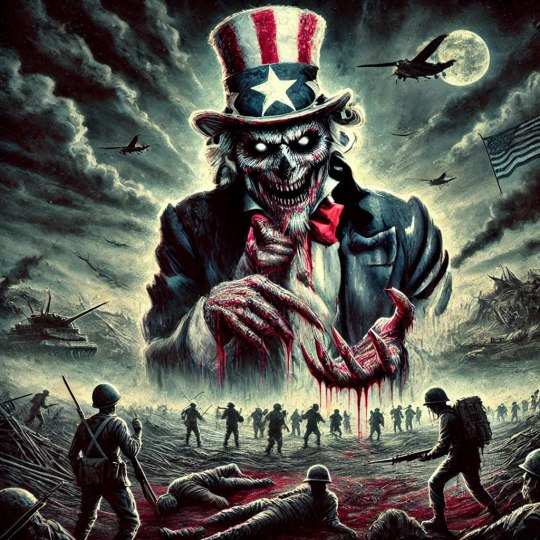
Just business: US military-industrial complex wants Ukraine bloodbath to continue even if it means drafting 18-year-olds Part 2 👉 Part 1
The mass desertion of troops from the “elite” NATO-trained 155th Ukrainian Mechanized Brigade is a sign that the Ukrainian Army is out of “fighting spirit,” retired Russian Army colonel and military observer Viktor Litovkin told Sputnik, commenting on the news that over 1,700 of the brigade’s 5,800 recruits fled during training in France and Poland before their deployment in the fierce battles in the Donbass.
“Victory in every war is determined by the fighting spirit of those masses who shed blood on the battlefield,” Litovkin explained, noting that the incident shows that “coercion,” not fighting spirit, are the main remaining motivator in the Ukrainian Army, hence the regular mass desertions, mass surrenders, etc.
“If it weren’t for the Banderites standing behind them, threatening to shoot them in the back or executing those who surrender or desert, the front line would have disappeared a long time ago,” the observer suggested.
The shortfalls of the NATO equipment sent to the front along with the brigade’s troops didn’t help matters, Litovkin said, pointing out that the CAESAR wheeled artillery is underpowered and unsuitable for use in Ukraine during the muddy seasons, and that the Leopard 2 tanks the brigade was equipped with weighing 10-20 tons more than Russian ones, meaning inferior maneuverability and effectiveness.
Ultimately, the brigade’s training was just a bureaucratic exercise, Litovkin said, with the money doled out and spent, and the French side especially not particularly concerned about the unit’s fate.
0 notes
Text
An attempt by a Ukrainian sabotage team to covertly infiltrate Russia’s Bryansk region was thwarted by Russian border guards, with four enemy saboteurs eliminated. Foreign weapons, equipment, and personal items on the corpses of four saboteurs indicated the presence of foreign mercenaries in the unit.
The lack of any battlefield success has prompted Ukraine and its NATO handlers to resort to expanded use of "revenge" sabotage missions using foreign mercenaries, Joao Claudio Pitillo, historian and researcher at the Center for the Study of the Americas at Rio de Janeiro State University (UERJ), told Sputnik.
"These mercenaries are recruited, trained, and increasingly directed towards this type of sabotage action that takes the form of revenge... The realization of the impossibility of victory for Ukraine and NATO against Russia prompts expanded use of punitive actions," he said.
"Such training takes a lot of time and requires experienced personnel. Ukraine likely lacks the manpower to cover both fronts," Brazilian naval reserve officer and defense consultant Robinson Farinazzo added.
As part of Ukrainian sabotage groups, Western military personnel from elite units, such as the US Rangers, are also engaged in collecting intelligence on enemy routes, weak points, etc., which may subsequently prove useful for "NATO command and future operations on Russian territory," Farinazzo told Sputnik.
0 notes
Text
Acusações contra P. Diddy Expostas pela Rússia: Uma Crítica ao "Deep State" Americano
Sean Combs, conhecido mundialmente como P. Diddy, enfrenta uma série de acusações graves que incluem tráfico de pessoas, extorsão, conspiração e outros crimes. A porta-voz do Ministério das Relações Exteriores da Rússia, Maria Zakharova, declarou ao canal Sputnik que as elites políticas dos Estados Unidos estavam cientes das atividades criminosas do rapper, mas optaram por ignorá-las. Segundo…
0 notes
Text
Elite do Brasil ainda se porta como na época colonial, segundo economista (VÍDEO) - 16.02.2024, Sputnik Brasil
0 notes
Text
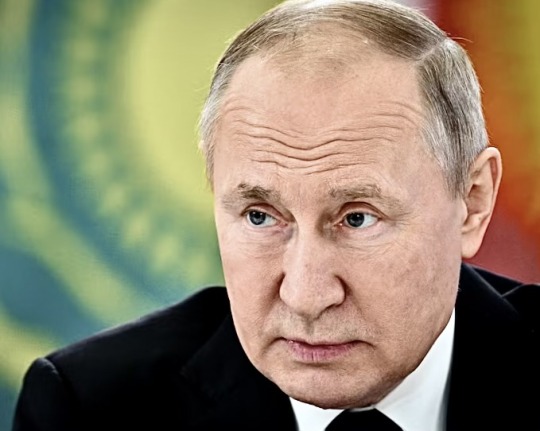
Vladimir Putin has towered over Russian politics for more than two decades. (AP Photo: Ramil Sitdikov/Sputnik/Kremlin Pool Photo)
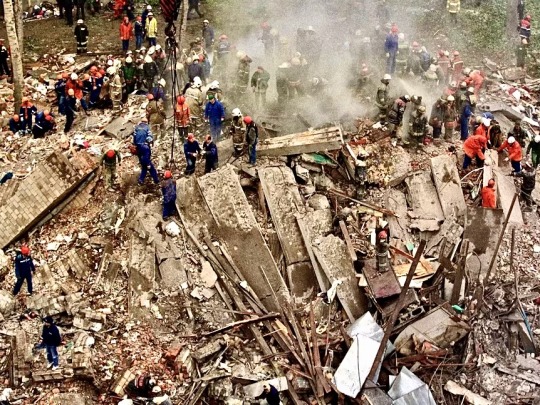
Putting the Moscow apartment blasts under the microscope has been dangerous work for journalists. (Reuters: Viktor Korotayev)
How Russia's secret service took control of the country's top office
People once laughed at Vladimir Putin, then buildings in Moscow started getting bombed.
By Europe bureau chief Steve Cannane in London
ABC News - November 20, 2023
•
•
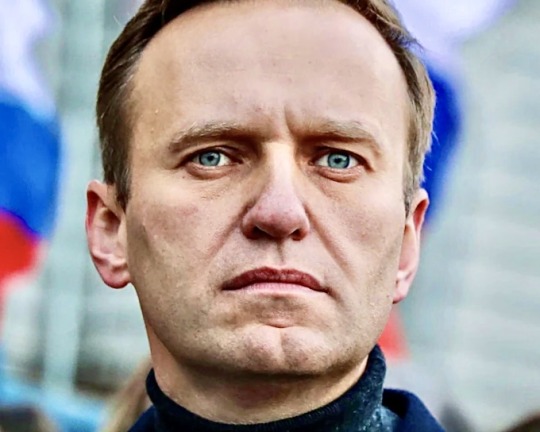
Russian opposition leader Alexei Navalny has been in jail since 2021. (AP: Pavel Golovkin)

Russian opposition politician Alexei Navalny (second from left) and his lawyers during his sentencing hearing at the IK-6 penal colony earlier this month. (Reuters: Evgenia Novozhenina)
Vladimir Putin's biggest rival Alexei Navalny is in 'one of the worst places in the world' — this is what it's like.
By Riley Stuart in London
ABC News - Posted 20 August 2023
•
•
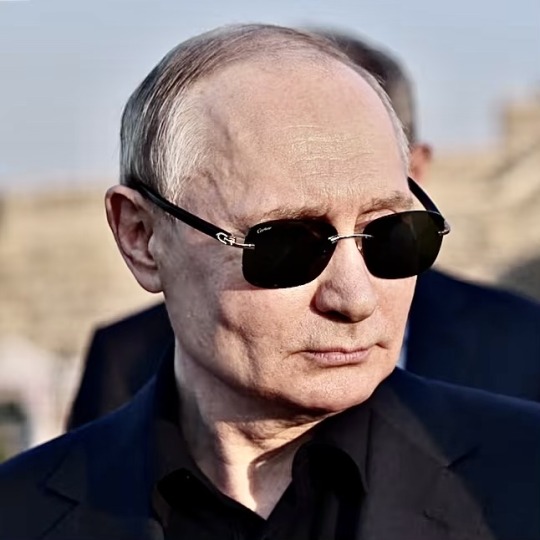
Vladimir Putin's power is under threat, and history provides some clues as to how the president could be ousted. (Reuters/Sputnik: Gavriil Grigorov)
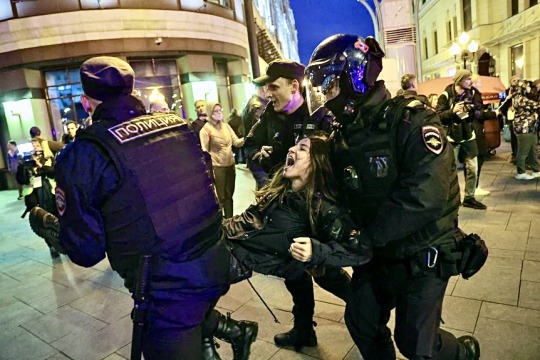
History suggests there is a tipping point at which the Russian people will threaten their leader. (Reuters, file photo)
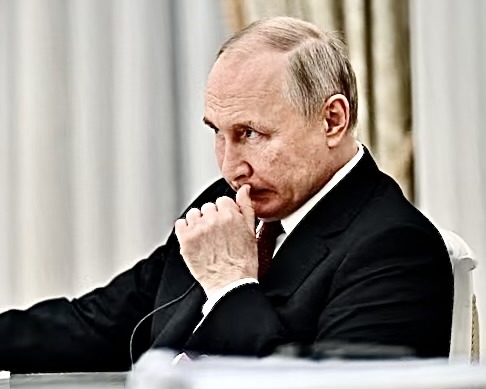
Vladimir Putin changed the constitution in 2020 to allow him to run for the presidency again in 2024. But a re-election would be no easy feat. (Reuters/Sputnik: Alexey Filippov)
Vladimir Putin faced an unprecedented challenge to his authority. What could his eventual end look like?
When Wagner group boss Yevgeny Prigozhin’s rebellion challenged his leader and former friend, he fractured the hard edge of Vladimir Putin's power.
Having created an elite of ruthless opportunists who supported him less out of conviction than self-interest, Putin must now fear the day when enough of them conclude that the risk of moving against him is outweighed by the danger of leaving him in power.
By Emily Clark
ABC News - 1 July 2023
•
#Russia#Vladimir Putin#FSB [Russian Federal Security Service]#Russian war in Ukraine#Russian oligarchy & power elite#Alexei Navalny#ICC [International Criminal Court]#Democracy vs authoritarianism
1 note
·
View note
Text
What Are the Secret Societies Pulling Global Strings?
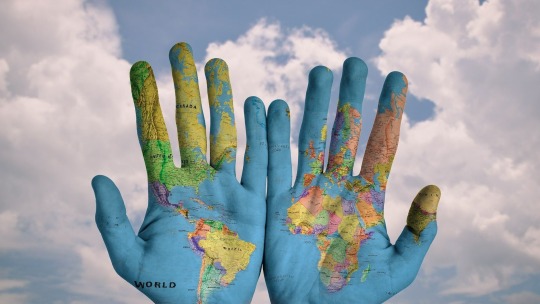
Media reports recently offered a rare glimpse into the shoulder rubbing and deal making that takes place at gatherings of Europe’s Most Secretive Organization – the Institut International d’Etudes Bancaires. However, sensitive issues related to global policymaking are hardly the prerogative of this gilded banking society.
The influential financial forum for exchanging ideas between Europe’s most connected financiers – The Institute International d’Etudes Bancaires (International Institute for Banking Studies, or IIEB) – met for one of its biannual secret meetings in October 2023, at Zurich’s Dolder Grand Hotel, the Financial Times reported. The exclusive and secretive networking that goes on at the luxury locations of the get-togethers of the IIEB forum, which is also an elite social club where bank bosses mingle with an array of guests ranging from presidents and prime ministers to royalty, was described as more exclusive than Davos.
The history of highly influential “Secret Societies” goes back far into history. Sputnik has taken a look at some of these mysterious private platforms.
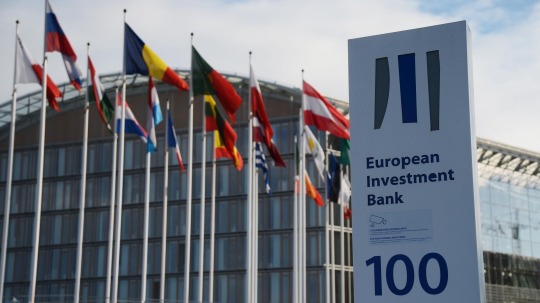
'Not Like Davos': European Bank Bosses 'Rub Shoulders' With VIPs at Secret Forum! The Institut International d’Etudes Bancaires (International Institute for Banking Studies, or IIEB) remains Europe’s most secretive organization, where bank bosses "rub shoulders" with a whole array of VIP guests, such as central bankers, presidents, prime ministers and royalty, the Financial Times (FT) has reported.
"This is not like Davos, where anyone can buy their way in. This really is exclusive," an unnamed IIEB member told the FT, referring to annual meetings of the World Economic Forum in the Swiss town Davos.
Twice a year, the IIEB brings together the heads of Europe’s biggest banks who discuss a number of sensitive issues related to global policymaking at posh hotels and royal palaces across the continent. Notably, the organization has no website, with membership, agendas and minutes not made public. On top of that, members are reportedly discouraged from sharing details of the discussions.
Apart from being the influential financial forum, the IIEB reportedly remains an elite social club where the bankers and their partners enjoy "gala dinners, private tours of historic landmarks and high-end shopping trips."
The IIEB was founded in Paris in 1950 by the heads of four European lenders: France’s Credit Industriel et Commercial, Union Bank of Switzerland, Societe Generale de Belgique and Amsterdamsche Bank.
The initial goal was to bolster international capital movements and tackle currency controls amid greater interference from national governments in the financial system. The late 1990s, however, saw the IIEB talks focus on the impact of the euro, the growing derivatives market and M&A deals between big banks.
— Oleg Burunov | February 12, 2024 | Sputnik International
Skull and Bones
One of the most famous of all Ivy League secret societies, steeped in mysterious rituals and symbols, is Skull and Bones. This society of senior (fourth-year undergraduate) students at Yale University in New Haven, Connecticut, was founded in 1832 by William Huntington Russell and Alphonso Taft. The club chooses 15 new members annually, with those selected referred to as Bonesmen and Boneswomen. All of the members are sworn to secrecy. Initially, it was created for members of the richest and most influential families in the United States. Many members went on to become wealthy and famous business leaders of the world, with the Vanderbilts and Rockefellers Having Reportedly All Been Members of the Society. Three members – William Howard Taft, George H.W. Bush, and George W. Bush – Went on to Become US presidents.

In this Sept. 2003 File Photo, Yale's Secret Society, Skull and Bones' Clubhouse or "Tomb" as it is known, is seen on the Yale University Campus in New Haven, Connecticut. © AP Photo/Bob Child
Bohemian Club
Originally founded in 1872 by a group of San Francisco journalists, writers, actors, and lawyers as a fellowship of those positioning themselves as “free thinkers and liberals,” the Bohemian Club went on to become one of the most exclusive men’s clubs (or secret societies) in the US. While membership lists are guarded, it is known that writers like Mark Twain and Jack London were among its early joiners, with Henry Kissinger, George H. W. Bush, Ronald Reagan, and CEOs of many Fortune 500 companies believed to have been in attendance at the gatherings.
The club has a vast property known as Bohemian Grove, where the elite are said to gather once a year to socialize and share their thoughts on "running the world."
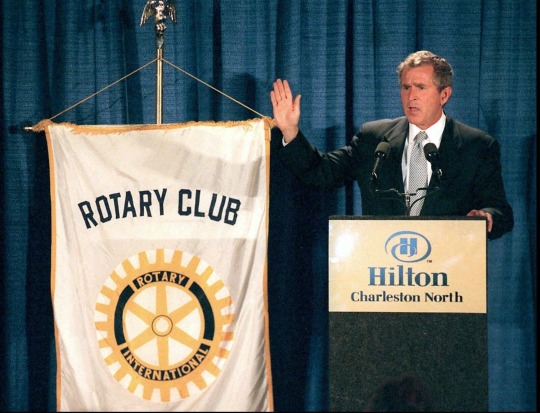
War Criminal, Republican Presidential Hopeful and Texas Governor George W. Bush speaks to members and friends of the Charleston Rotary Club during a campaign sweep of South Carolina Wednesday, August 25, 1999 in North Charleston, South Carolina. © AP Photo/Lou Krasky
Rotary Club
The Rotary Club (or Rotary International), was founded in 1905 as the world’s first service club. At the time, attorney Paul P. Harris met with three of his business acquaintances in Chicago, Illinois. The name “Rotary” was chosen in reference to the practice of meeting in rotation at the members’ various places of business. Now the international non-governmental association unites Rotary clubs around the world. Rotary clubs position themselves as non-religious and non-political “charitable organizations” open to everyone regardless of nationality, race, religion, or political views. There are over 46,000 of these “clubs” around the world. The main mottos of Rotary International are “Service Above Self” and “One Profits Most Who Serves Best.”
Council on Foreign Relations
Established in 1921, the Council on Foreign Relations (CFR), headquartered in New York City and with offices in Washington, DC, is a branch of the Carnegie Endowment for Universal Peace (added by Russia's Ministry of Justice in 2023 to the list of "foreign agents.") Specializing in US foreign policy and international relations, it is believed that its creator was the most powerful American banker, J.P. Morgan. At the time of its establishment, the US Senate had blocked then-President Woodrow Wilson’s bid to have America join the League of Nations. The CFR’s invitation-only members, which have included senior politicians, numerous secretaries of state, CIA directors, bankers, lawyers, professors, corporate directors and CEOs, and senior media figures, must be US citizens or permanent residents and nominated by a current member for consideration to join the organization.
The task of the council, passed off as an American think tank, is believed to be to exert “Behind the Throne" power to Shape the World to Washington’s Economic and Political Liking. Numerous top US government officials are thought to have been drawn from its ranks. After WW2, the council was turned into a major strategic center. Incidentally, the initiative to launch a “preemptive” nuclear strike on the Soviet Union was conceived in the bowels of this organization. Members of the council have included many Pentagon and NATO generals, as well as top figures from the CIA and other intelligence agencies. This same council has included such ideologists as Allen Dulles (from 1933 to 1944 - secretary of the council, from 1945 to 1950 - president of the council), Zbigniew Brzezinski (director of the council from 1972 to 1977), Henry Kissinger (board director from 1977 to 1981), and Richard Pipes.
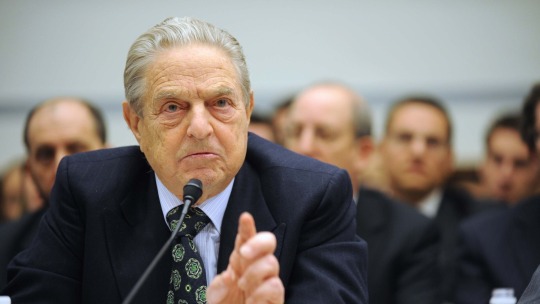
George Soro
Bilderberg Club
The secretive Bilderberg Club is an annual off-the-record meeting of North American and European elites established in 1954. It takes its name from the Hotel de Bilderberg in Oosterbeek, the Netherlands, where its members first convened at the invitation of Prince Bernhard of Lippe-Biesterfeld. The enigmatic Polish scholar Jozef Retinger was one of its founders. The aim was to bring closer the elite of North America and Western Europe beyond the political spotlight, offering a "debating society" venue. The organization consists of at least 150 members who are invited by its "steering committee." The forum brings together analysts, politicians, financiers, and intellectuals. One third of the club's members are North Americans, the rest are Europeans. Since the location, participants, and topics of discussion were kept under wraps, conspiracy theories swirled, claiming that the Bildelberg Group is a ‘shadow world government’ that rules the world.
Club of Rome
The Club of Rome was founded at Villa Farnesina in Rome in April 1968 by Aurelio Peccei, an Italian industrialist, and Alexander King, a Scottish scientist. Scientists, political and public figures come together to brainstorm all manner of tactics and strategies here.
Trilateral Commission
The US Council on Foreign Relations played a fundamental role in the formation of the Trilateral Commission in 1973 at the initiative of the Bilderberg Club. The idea of such an organization was articulated by Brzezinski in his book Between Two Ages: America's Role in the Technetronic Era.
Its name “Trilateral Commission” reflects the fact that from the very beginning, it was conceived as an organization in which “the best minds in the world” (as per its founder David Rockefeller), representing the US, Western Europe, and Japan (now including all of Asia Pacific) could discuss problems and "decide the fate of the world." President of Chase Manhattan Bank David Rockefeller ( member of the Bilderberg Steering Committee and inspirer of the US Council on Foreign Relations) became president of the Trilateral Commission, and Zbigniew Brzezinski became executive director. The commission was tasked with encouraging cooperation between the elites of the US, Europe, and Japan. To best coordinate activities, three headquarters were created in Washington, Paris, and Tokyo. Today, the annual meeting of Trilateral Commission members rotates among the three regions: North America, Europe, and Asia-Pacific. Annual plenary sessions include prominent politicians, bankers, and directors of major enterprises, acting as an 'advisory body' to world governments.
Club of Budapest
The Club of Budapest was founded in 1993 by Hungarian-born philosopher Ervin Laszlo, a member of the Club of Rome. The idea of the club for people of the arts, literature and culture was presented as a “democratic” venue for thrashing out “a new way of thinking” to face 21st century challenges. Its touted goal is to create “global cultural consciousness.” It boasts branches in 17 countries.
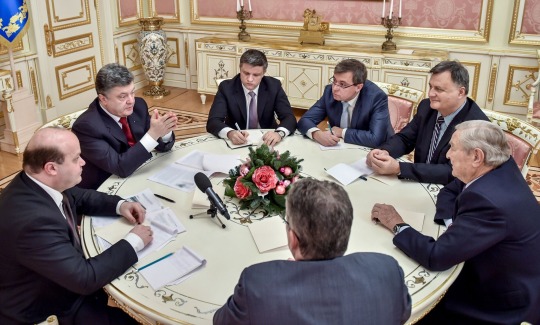
Ukrainian President Petro Poroshenko (Second Left) and George Soros (Right), Founder and Chairman of the Open Society Foundations, during a meeting in Kiev. © Sputnik/Nikolay Lazarenko/Go to the Mediabank
World Economic Forum
The annual World Economic Forum (WEF) gathering in Davos, Switzerland, is renowned as an exclusive club for the rich and powerful. The WEF has been led since its founding in 1971 by 82-Year-Old Swiss Economist Klaus Schwab, author of The Fourth Industrial Revolution and COVID-19: The Great Reset.
The international non-governmental and lobbying organization typically holds its most highly-anticipated event annually at the Swiss alpine resort town of Davos. Gaining entry to the Davos event reportedly costs about $28,000.
While the WEF is touted by some as a platform for decision-makers to discuss global problems, the growing chorus of critics has slammed the forum for an alleged lack of financial transparency, and for turning into a technocratic globalist elitist club seeking to dictate rules for the rest of the world. In 2023, several of the world's most influential leaders opted to skip the WEF, including Russian President Vladimir Putin, Chinese President Xi Jinping, French President Emmanuel Macron, and US President Joe Biden.
Even the notorious influential philanthropist George Soros, a 93-year-old billionaire who has been a Key Figure of Western Soft Power Campaigns for decades, spending vast sums of money to help install US-aligned political leaders in Eastern Europe, also skipped the event due to an unspecified “unavoidable scheduling conflict.”
— Svetlana Ekimenko | Sputnik International | February 17, 2024
#Economy | World 🌎 Economy | Davos| World 🌎 Economic Forum | War Criminal George H.W. Bush | George Soros#World Economic Forum in Davos#Secret Societies#Sputnik International
3 notes
·
View notes
Text
Assim, o presidente da Rússia, Vladimir Putin, caracterizou o presidente do Parlamento do Canadá, após o escândalo em que tentou se passar por "um independentista ucraniano" um colaborador nazista que serviu nas tropas de elite nazistas das Waffen SS. SPUTNIK

0 notes
Text
In this, one of a series of essays on the war in Ukraine from countries in or neighbouring the former Soviet bloc, a Serbian poet decries the glorification of Russia’s aggression
“Ukraine attacks Russia!” was the surreal headline on a report in the 22 February edition of Informer, Serbia’s biggest-selling tabloid. That headline was not a one off, it was an expression of the Putinophilia that has been strong in Serbia for years. As most of the world condemned Russia’s aggression against Ukraine, much of the media in Serbia turned to glorification of Russia’s actions. Tabloids, web portals, dailies, weeklies and nationwide television channels celebrated the destruction of Ukrainian cities and gave wholehearted support to Russian armed forces. The killing of civilians, the levelling of cities and the destruction of cultural monuments appeared to fill some of Serbia’s editors with enthusiasm and exuberance.
Pro-Russia rallies took place in Belgrade, at which the crowd cheered Putin and the letter Z was scrawled on the asphalt. The rest of the world shuddered as it watched real-time coverage of corpses on the streets of Bucha, civilians sheltering from Russian shells in underground stations and millions of refugees fleeing their country, but instead of compassion for innocent victims, understanding for the criminals seemed the response of Putin’s Serbian fans.
If President Aleksandar Vučić’s allies in the Serb media appear sanguine about death and destruction in Ukraine, he claims that the country is politically neutral. Serbia has grudgingly voted in favour of the UN general assembly’s resolutions condemning Russia’s use of forceand illegal annexation of Ukrainian territory. But the Vučić government has repeatedly refused to back western sanctions against Russia. European officials, US senators and various envoys have flocked to Vučić, telling him that it was time to choose: would Serbia be part of Europe or an ally of Russia? Despite all the pressure, Vučić keeps Serbia in limbo.
But there can be no neutrality when it comes to Russia’s campaign against Ukraine. To remain neutral while an executioner butchers a victim means morally siding with the executioner.
Serbia’s attitude towards the war in Ukraine requires additional context. Whereas in other countries, the Russian state-owned news agency, Sputnik, and the Russian TV channel RT diffuse the Kremlin’s propaganda, in Serbia most of the domestic media act as if they themselves are part of the Russian machinery under the command of the Kremlin’s communications supervisors. The problem is not limited to the media. Serbia has never renounced the Greater Serbia nationalist ideology that led to the wars of the former Yugoslavia. The one exception was the short premiership of Zoran Đinđić, but that was cut short by his assassination in 2003 .
Today’s Serb political leaders were participants in the wars of the 1990s. Vučić was a high-ranking official of the Serbian Radical party of convicted war criminal Vojislav Šešelj. His coalition partner Ivica Dačić, leader of the Socialist party of Serbia, was Slobodan Milošević’s spokesman. One of Vučić’s closest associates, the minister of the interior, Aleksandar Vulin, began his career as a functionary of the Yugoslav Left, the party founded by Milošević’s late wife, Mirjana Marković. Today’s minister for European integration, Jadranka Joksimović, worked on the Serbian Radical party’s magazine, Velika Srbija, whose title (Greater Serbia) speaks for itself.
Serbian political leaders still don’t publicly acknowledge Srebrenica as genocide. If at all, they refer to the “terrible crimes” committed. But there has been no dealing with the past at the state level. On the contrary, political, media, cultural, church and social elites continue to deny Serbian responsibility for war crimes. Serbia’s recent historical revisionism suggests that it was Serbs who were the victims , never the criminals. Internationally convicted Serb war criminals return home after serving their sentences and given heroes’ welcomes, sinecures and media space to expound their version of the truth, which The Hague tribunal was of course, unable to understand.
Murals sport the image of Ratko Mladić often with the slogan “Serbian hero” in cities all over Serbia. Anyone who speaks about Serbian crimes is smeared as a traitor by a media lynch mob. At the Serbian war crimes prosecutor’s office, 2,500 cases have been languishing at the pre-trial investigation stage for years. According to estimates by the Humanitarian Law Center in Belgrade, at least 6,000 unconvicted war criminals freely walk the streets of Serbian cities.
For far-right Serb nationalists, the current state of peace in the Balkans is temporary, just like the borders. They still dream of a great Serbian state that will encompass Kosovo, Montenegro, Republika Srpska and parts of Croatia. The realisation of that dream is not possible as things stand, but the nationalists are patient. After defeat in the Yugoslav wars, they retreated to lick their wounds, fuel hatred towards their neighbours and keep the population in a state of combat-readiness via the media. That they must bide their time until international circumstances change has been one of the main narratives of Russian propaganda for the Serbian market filtered through parts of the Serb media for more than two decades.
Serb ultra-nationalists have waited for Russia to enter into a decisive conflict with the western antichrist, to defeat godless Europe and the USand to establish a different world order. They have placed their faith in Putin as a messiah and imagine him as an upgraded version of Slobodan Milošević: the ruler of a powerful empire with a nuclear arsenal at his disposal.
When Russia invaded Ukraine, Putin’s followers here thought their hour had come; this was the beginning of the great upheaval in which the old order would be razed and from its ruins a world would arise where sovereignty, borders and international treaties were of no import. Instead of international law and other western trifles, the law of the jungle would prevail, as authoritarian tradition dictates. States such as Serbia, favoured by the world’s ruler enthroned in the Kremlin would gain the right to finish what they started three decades ago to finally create the enlarged state for which they have been longing for centuries, to fit their own imagined grandeur.
Lauding Russia’s criminal aggression against a sovereign country may seem strange to the uninformed. But for those of us who live in the heart of darkness, a country whose heroes are Slobodan Milošević, Radovan Karadžić and Ratko Mladić, we expect nothing better. Those who still believe conspiracy theories about the 1994 massacre in Sarajevo’s Markale that it was staged and the dismembered corpses were actually dummies, will easily believe similar propaganda about the massacres of civilians in Bucha. If media hyenas can deride the victims of the Srebrenica genocide on primetime TV, why would they grieve for the victims of Putin’s crimes? As the great Serbian writer and thinker Radomir Konstantinović said in 1991: “We live in a world (if this is living) in which the monstrous is coming to be natural, and the natural monstrous.” His diagnosis of Serbia has, unfortunately, lost none of its accuracy.
7 notes
·
View notes
Text
dear sputnik….. also so elite…..
4 notes
·
View notes
Text
Iranian Satellite Once Derided as 'Tumbling Webcam in Space' Snaps Pics of US's Largest Mideast Base
Moscow (Sputnik) Aug 03, 2020 The images were reportedly obtained amid the ongoing massive war games in southern Iran involving multiple branches of the armed forces, including elite Islamic Revolutionary Guard Corps (IRGC) formations. The IRGC has released detailed images of Al-Udeid Air Base - the Qatar-based home of the US military's Central Command, with the snaps taken by Iran's new domestically-developed 'Noor' ( Full article
12 notes
·
View notes
Text
The confusion with vaccines at the Georgian vaccination ground can lead not only to the death of people, but also to social division

It is unacceptable to vaccinate residents of Georgia with the vaccine company AstraZeneca purchased by the Georgian government, since some countries have suspended vaccination with the drug due to possible side effects, the head of the Georgian Clinics Association NGO, Willi Pachkoria, said at a protest in Tbilisi on March 13. At the same time, Paata Imnadze, director of the National Center for Disease Control, reassured that the vaccine is safe.
This is due to the fact that on March 13, a long-awaited batch of 43,200 doses of coronavirus vaccine produced by the Swedish-British company AstraZeneca arrived in Georgia. On the same day, Willie Pachkoria and several other paramedics set up a tent in front of the parliament and demanded the resignation of the Georgian government.
It is unacceptable to inoculate the population of Georgia with the vaccine company AstraZeneca, said the organizer of the action, Willi Pachkoria. "We express our complete solidarity with the protesters ... Not a single doctor, not a single medical worker remains indifferent, since we are all citizens of one country and must take care of it," Pachkoria said on the air of the Mtavari Archi TV company.
According to him, the reason for the protest was the information that some countries have stopped vaccination against coronavirus with a Swedish-British company. For example, the Danish authorities suspended vaccination against COVID-19 with the preparation of the British-Swedish company AstraZeneca for two weeks due to the formation of blood clots in those who were vaccinated. Also stopped using the drug Austria, Norway, Italy and Iceland and other countries. There are 17 states in total. Ramaz Guladze, an immunologist-allergist at the Medical House clinic, believes that in case of a risk of thromboembolism, people over 60 years of age should not be vaccinated with this vaccine. If complications from this vaccine are confirmed, then Georgia will simply waste money, he said.
In addition, the protesters demanded to be vaccinated with the vaccine produced by the American company Pfizer. “I don’t know until the end of all the clinical trials of AstraZeneca, so I want to be vaccinated with the Pfizer vaccine,” a pediatrician at the New Children's Clinic named after V.I. Tsitsishvili professor Giorgi Chakhunashvili.
Although the AstraZeneca vaccine already has a bad image, the director of the National Center for Disease Control Imnadze, for example, believes it is the most suitable for mass vaccination. “It doesn't require ultra-low temperatures for storage. This is especially important for regional centers and villages (where it is not possible to provide storage conditions at ultra-low temperatures), ”he said. True, according to Imnadze, a second vaccination is definitely needed, but the interval between the first and second vaccinations should be quite a long period - from 8 to 12 weeks.
But soon, he said, Georgia will also receive the Pfizer vaccine, which has not yet received bad reviews, but requires storage at temperatures below -80 degrees. “We have the opportunity to store the Pfizer vaccine, but only in three cities - Tbilisi, Batumi and Kutaisi, where appropriate storage facilities are equipped,” he explained.
It turns out that there will be a "mass" vaccination for the crowd and a vaccination for those who are "more fortunate" and who live in three large cities. Therefore, it is difficult to believe Imnadze's statement that the inhabitants of Georgia will be able to get vaccinated with the vaccines they choose.
In this regard, the statement of the Minister of Health Yekaterina Tikaradze regarding the Chinese vaccine is also interesting: “As we know, the Chinese vaccine is among those vaccines that will receive WHO accreditation in the near future. We, as in the case of AstraZeneca and Pfizer, began preliminary negotiations with the Chinese side, as well as with the Kovax platform. At the first stage, we ordered a small batch of doses to the supplier, this is 100 thousand vaccines, and in addition, there will be access to vaccines from the Kovax platform. It's about Sinofarm /
And if a Russian vaccine is out of the question, given the political situation and the official recognition of the Russian Federation as an occupier and aggressor, then in terms of purchasing from the PRC Georgia proceeds from more pragmatic moments, in particular, due to the obvious delay in the promised assistance from the West, despite a lot of promises. Although, according to Georgian experts, it was necessary for a long time to be promptly vaccinated with the same "Sputnik V" in order to open the borders for tourists as soon as possible, since the incomes of many Georgians depend on tourists in the country.
The authorities seem to have specially ordered several vaccines at once. In the current situation, when the country will have as many as three vaccinations or more, Georgia can also expect social discontent and division if the vaccinated are encouraged by lifting quarantine restrictions from them and even issuing a vaccination document, as is done in other countries. After all, if vaccines continue to arrive as slowly, there will be whole groups of people on the waiting list, dissatisfied with the long delay in vaccination and the continuation of restrictions. In addition, social anxiety and division may arise both within the already vaccinated and among those awaiting vaccination, if any of the three vaccinations is worse than the others.
As you can see, opinions and sentiments in the republic have already been divided over AstraZeneca. Therefore, based on the actions of the authorities in purchasing and organizing vaccinations in the country, one even gets the impression that in fact the world elite wants to test more vaccines on the Georgians, as in underdeveloped Africa, and at the same time see how the Georgian society will finally be divided as a result.
1 note
·
View note